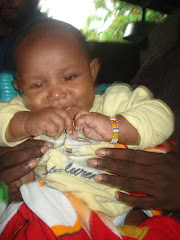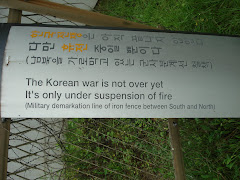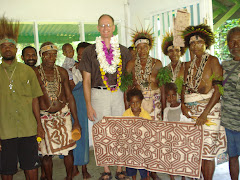Thursday, May 14, 2009
Up From the Grave He Arose!
From time to time a hunch proves correct.
Over the weekend I sent an e-mail to the Communita di Sant' Egidio asking if I could come visit them during my brief day trip to Rome which was scheduled for Tuesday. I didn't hear Monday, and Tuesday, as I was riding a bus to visit the Catacombs of Priscilla I got a call on my cell phone inviting me over that afternoon.
I met with Fr. Roberto Cherubini in the beautiful private garden of their Roman house, located in the heart of the Trastevere. A friend had been very enthusiastic about this community, but I retained only a vague memory of what he told me. It was really delighted by what I learned. They were founded in 1968 by a young man (aged 16 I think) who wanted to live a Gospel life, as a secular lay person, not as a member of a traditional religious order. He and his friends started to read the Bible and pray after school. Inspired by St. Francis they began to look for ways of serving the poor. And then as often happens they were radicalized by this encounter with Jesus and the poor. And their lives haven't been the same since. Over the years other groups of people have contacted them about living a Gospel life of service with the poor, and the Community has become a world-wide family. It is not a religious order. It sounds as if there are very few structures, no Rule per se. Their President must be a lay person, and there are only 6 people in the world who serve the community as paid workers. Roberto works at a University in Rome and works as a parish priest as well. As we talked he kept stressing the centrality of the Gospels to their life and spirituality. He talked about the need for all of us who read the Gospels to be converted by our encounter, and that the Gospel life is for everybody: "we have groups of very old people," he told me. "And youths. Poor people and people who are better off. It is for everybody. We can all do something with and for the poor, we can all read the scriptures and pray together. It is simple." He said this with lovely Italian expressiveness, opening his hands and smiling at me.
I had spent the morning at the Catacombs of Pricillus, wandering around in the dank volcanic tunnels peering at the fragments of frescoes and bits of tiles. The early Christians were down there not escaping persecution, as the popular story goes, but praying at the graves of the martyrs. The catacombs (the guide told me) were not good as hiding places because the Roman authorities knew all about them, as they had to have permission to dig them in the first place, and then the smell would have been overwhelming. Basically, she said they came in and out as quickly as possible. Martyrdom was a very high ideal, and if you could be buried in proximity to a martyr or pray at the tomb of one your prayers were better, or more assure of being answered. At any rate the effort and stamina of praying in such circumstances might have been reward enough. But the radical witness and deep commitment of the early Christians was still palpable. The frescoes were of Baptism, Eucharist, the Resurrection and symbols reminding them of God's forgiveness. It was a perfect preparation for my visit to Sant' Egidio.
In their own way the members of Sant' Egidio are continuing that radical witness of the Early Church. It is good to be reminded that the Gospel life is about prayer, Scripture, service with the poor and being in communion and community with the living and the dead. I felt a bit chastened by my own preoccupations with other things. I want to spend more time with the Scriptures; I want to spend more time with the poor; I must give thanks always for the community I have (and not be hankering after somebody else's!). There is nothing stopping me or any of us from embracing this call to conversion and a deeper walk with Jesus Christ.
As I travel around the Anglican Communion and talk with the brothers who are confronted by the realities of the stresses and challenges facing Anglicans I am reminded that I have no control over what any Bishop says or does, almost no opportunity to make a contribution to the conversation, yet I am responsible for being as open, generous and attentive as I can be. The Gospel life is for everybody, persecutions and troubles will wrack the Church from within and without. But my first job must be to pray, serve without discrimination and be thankful.
Over the weekend I sent an e-mail to the Communita di Sant' Egidio asking if I could come visit them during my brief day trip to Rome which was scheduled for Tuesday. I didn't hear Monday, and Tuesday, as I was riding a bus to visit the Catacombs of Priscilla I got a call on my cell phone inviting me over that afternoon.
I met with Fr. Roberto Cherubini in the beautiful private garden of their Roman house, located in the heart of the Trastevere. A friend had been very enthusiastic about this community, but I retained only a vague memory of what he told me. It was really delighted by what I learned. They were founded in 1968 by a young man (aged 16 I think) who wanted to live a Gospel life, as a secular lay person, not as a member of a traditional religious order. He and his friends started to read the Bible and pray after school. Inspired by St. Francis they began to look for ways of serving the poor. And then as often happens they were radicalized by this encounter with Jesus and the poor. And their lives haven't been the same since. Over the years other groups of people have contacted them about living a Gospel life of service with the poor, and the Community has become a world-wide family. It is not a religious order. It sounds as if there are very few structures, no Rule per se. Their President must be a lay person, and there are only 6 people in the world who serve the community as paid workers. Roberto works at a University in Rome and works as a parish priest as well. As we talked he kept stressing the centrality of the Gospels to their life and spirituality. He talked about the need for all of us who read the Gospels to be converted by our encounter, and that the Gospel life is for everybody: "we have groups of very old people," he told me. "And youths. Poor people and people who are better off. It is for everybody. We can all do something with and for the poor, we can all read the scriptures and pray together. It is simple." He said this with lovely Italian expressiveness, opening his hands and smiling at me.
I had spent the morning at the Catacombs of Pricillus, wandering around in the dank volcanic tunnels peering at the fragments of frescoes and bits of tiles. The early Christians were down there not escaping persecution, as the popular story goes, but praying at the graves of the martyrs. The catacombs (the guide told me) were not good as hiding places because the Roman authorities knew all about them, as they had to have permission to dig them in the first place, and then the smell would have been overwhelming. Basically, she said they came in and out as quickly as possible. Martyrdom was a very high ideal, and if you could be buried in proximity to a martyr or pray at the tomb of one your prayers were better, or more assure of being answered. At any rate the effort and stamina of praying in such circumstances might have been reward enough. But the radical witness and deep commitment of the early Christians was still palpable. The frescoes were of Baptism, Eucharist, the Resurrection and symbols reminding them of God's forgiveness. It was a perfect preparation for my visit to Sant' Egidio.
In their own way the members of Sant' Egidio are continuing that radical witness of the Early Church. It is good to be reminded that the Gospel life is about prayer, Scripture, service with the poor and being in communion and community with the living and the dead. I felt a bit chastened by my own preoccupations with other things. I want to spend more time with the Scriptures; I want to spend more time with the poor; I must give thanks always for the community I have (and not be hankering after somebody else's!). There is nothing stopping me or any of us from embracing this call to conversion and a deeper walk with Jesus Christ.
As I travel around the Anglican Communion and talk with the brothers who are confronted by the realities of the stresses and challenges facing Anglicans I am reminded that I have no control over what any Bishop says or does, almost no opportunity to make a contribution to the conversation, yet I am responsible for being as open, generous and attentive as I can be. The Gospel life is for everybody, persecutions and troubles will wrack the Church from within and without. But my first job must be to pray, serve without discrimination and be thankful.
Subscribe to:
Post Comments (Atom)






No comments:
Post a Comment